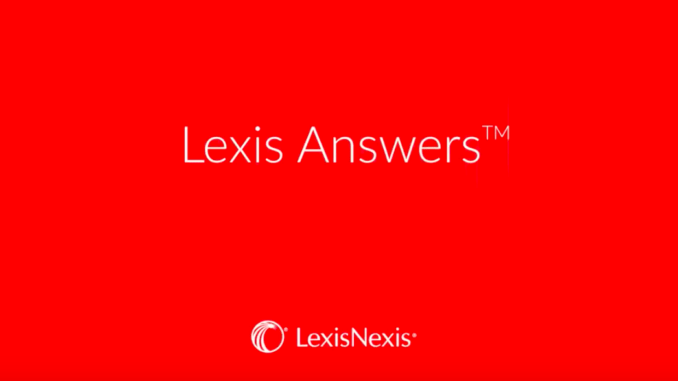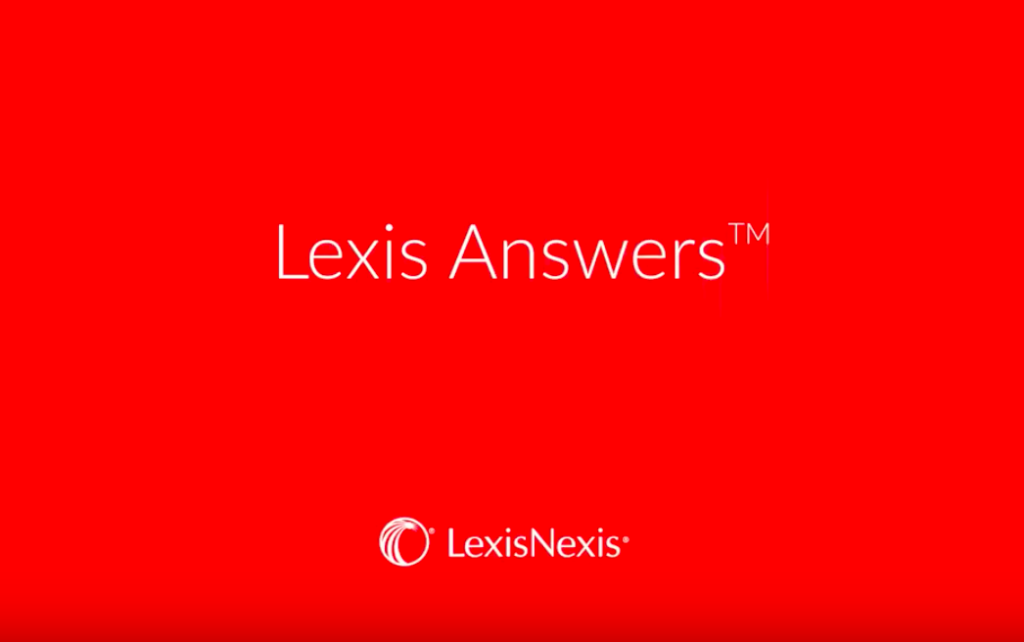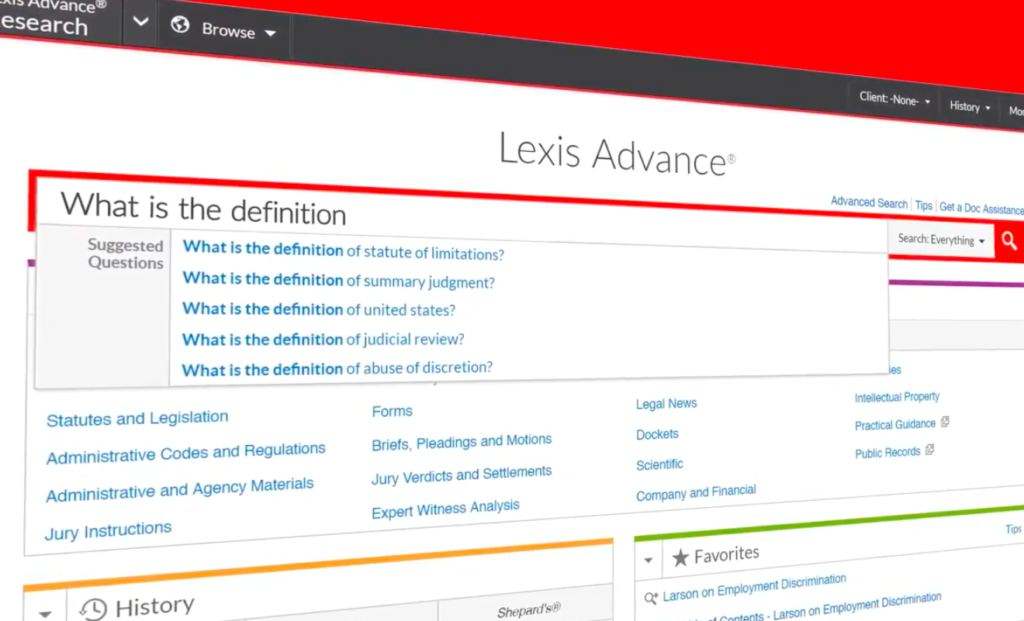
Artificial Lawyer recently caught up with LexisNexis to learn more about their new AI-driven legal research platform, Lexis Answers. In this Guest Post, Jeff Pfeifer, vice president of Product Management for LexisNexis, kindly explains what all the excitement is about.
Jeff has had a 28-year career in legal technology. He has worked to introduce a series of solutions for lawyers and other legal professionals. He is also responsible for the product development strategy for LexisNexis in North America.
In this piece several areas of interest are covered, ranging from how LexisNexis views the use of AI in the legal world; what part AI acquisitions Lex Machina and Ravel have played in its strategy; and what other new AI applications LexisNexis would like to explore in the future. Jeff also gives a very clear vision of just how important legal data will be as the profession continues to evolve.

Why does LexisNexis believe AI is so important to the legal sector?
The legal market has become a data-driven industry, and today’s attorneys must leverage advanced technologies in order to do their jobs efficiently and effectively.
As the amount of legal data generated increases, the amount of legal research and analysis that lawyers must review has become unmanageable. For example, there are more than 14 million legal case decisions and millions of legislative bills and regulations recorded in the US.
At LexisNexis, we ingest massive quantities of data — 13 million new documents daily from more than 50,000 data sources in varying formats. In total, we have more than 60 billion documents and 2.5 petabytes of legal data stored in our legal big data platform. Without advanced technologies helping attorneys to sort through and glean insights from all of this data, an army of associates working 24 hours a day would not be able to the information pertinent to the job of today’s modern lawyer.
Compounding the challenge for today’s attorney? Companies expect their in-house and outside counsel legal teams to do more with less. Gone are the days when Legal had unlimited budget to address business issues. Today, legal departments are being held to the same P&L standards as other functional departments and they’re scrutinising outside counsel spending on legal research, eDiscovery, and other activities more than ever before. As such, legal teams must become much more efficient, working smarter and faster, and above all delivering positive outcomes.
Intelligent products and tools incorporating machine learning, natural language processing, cognitive computing can assist attorneys in making smarter, data-driven decisions. For instance, A.I. technologies can uncover trends, patterns and probabilities that can improve decision-making and legal strategy development. They can flag potential issues within contracts, legal briefs or motions and suggest possible fixes or other courses of action. They can understand the content and context of attorney searches, and better anticipate their needs by finding and presenting the exact data and specific passages within relevant case law – regardless of the complexity of the content or context of their search.
Similar to the way PCs, the Internet and early productivity gains revolutionised the legal industry, A.I. is expected to drive the next evolutionary step in the advancement of our industry.

It’s my sense that attorneys shouldn’t be concerned about the underlying technologies – after all, it’s all just software layered with human insights. Word processing did not replace lawyers – it made them more efficient and productive. Availability of information on the internet has not diminished the need for lawyers – it has created more context for important decisions.
We are very early days in the use and deployment of artificial intelligence. What I hear most is the criticality of building A.I. infused products that are intuitive – “I understand how to use these technologies and why I need them;” provide immediate utility – “I recognize the time/cost-saving benefits of this technology and see how it positively impacts my practice, workflow and results;” and improves the user experience.
How useful has having Lex Machina and Ravel Law been for Lexis Answers?
We are very excited about the acquisition of Lex Machina, Ravel and Intelligize. Each company was doing important work in A.I. that aligns with our vision for the future of data-driven law. From language analysis to advanced analytics, each company is working in areas complimentary to advanced machine learning and cognitive computing work underway at LexisNexis.

Ravel’s judicial analytics, data visualisation technology and unique PDF case law content from the Harvard Law Library will be fully integrated into our Lexis Advance and the Lexis Litigation Profile Suite flagship products. Its machine learning technologies mine published case opinions and extract content from legal documents to improve our answer set, which helps Lexis Answers deliver the most concise and authoritative answer to a user’s query.
Ravel’s technology team and data scientists will join colleagues within LexisNexis, Lex Machina and Intelligize who are all working to leverage the latest A.I. technologies to solve customer problems, extract powerful insights from data and give attorneys a competitive advantage.
Regarding Lex Machina, the company was not directly involved with Lexis Answers, however it solved a major technical challenge that no one else in the industry was doing – fixing the errors, omissions and inaccuracies within PACER data, and normalising it so that it can be used across a number of data-driven applications. LexisNexis is radically expanding our efforts based on their work, which will ultimately improve the ability of Lexis Answers to deliver the most concise and authoritative answers.
And finally, we are leveraging technology from Intelligize that will allow law firms to mine, tag and leverage internal work product. Intelligize has distinguished itself in its ability to mine SEC filings, documents and transaction materials. We’re piloting ways to apply that same language tagging and extraction behind a firm’s firewall.
Will this be only in the US?
Lexis Answers is initially available to customers in the US, at no additional cost. We’re working on ways to extend the technology to users in other markets around the world.
What other areas does Lexis use AI in now?
Lexis Answers is the company’s first foray into cognitive computing, however A.I. technologies have been an important part of the LexisNexis product portfolio for many years. In 1990, LexisNexis pioneered the industry’s use of machine learning, and in 1993, it launched its first data visualisation application —decades before the mainstream use of these technologies. Since then, LexisNexis has been actively pursuing machine learning, advanced natural language processing, cognitive computing and other capabilities.
Other products from LexisNexis augmented with advanced machine learning technologies include Lexis Advance, LexisNexis MedMal Navigator, the Lex Machina Legal Analytics platform, Ravel Law and Intelligize.
Where would it like to make use of AI in the future for the legal sector?
For more than 20 years, the LexisNexis iLabs R&D team has been researching, developing and deploying cutting-edge technologies in order to enhance its product portfolio and advance the industry. As a RELX company, we also leverage the tech expertise and R&D of our parent company and its associated brands to expand our scope of knowledge and research.
Many of iLabs’ early R&D initiatives focused on machine learning, cognitive computing and natural language processing, which have been implemented across LexisNexis’ current product portfolio and form the basis of future intelligent applications and enhanced offerings.
Looking ahead, we’re excited about the prospects and possibilities that A.I. brings to the legal industry. Some of the areas we find most promising include:
- Deep learning capabilities through artificial neural networks
- Advanced interfaces, such as cognitive assistants or chatbots that can communicate both via voice and text input/output.
- Entity extraction and relationship mapping for improved data analytics and visualisation
- Personalisation, where the technology “learns” the needs of it users, anticipates their needs based on their past behaviors, remembers where they left off in their legal research, and delivers more customised results based on their role within the organisation.
- Smarter decisioning tools such as prescriptive analytics that can proactively make recommendations on what legal strategies to employ, based on outcomes of similar cases.
- Greater human/machine interaction, such as asking the user questions if the system does not have enough information to make a decision or recommendation; proactively conducting legal or Internet research to find relevant information that can support or refute the user’s case; or even draft case arguments based on fact patters or case concepts, using verbiage taken from the outcomes of similar, successful cases.
[If you would like to see a short video on how Lexis Answers works, please check out the 1.50 min introduction below. ]
2 Trackbacks / Pingbacks
Comments are closed.